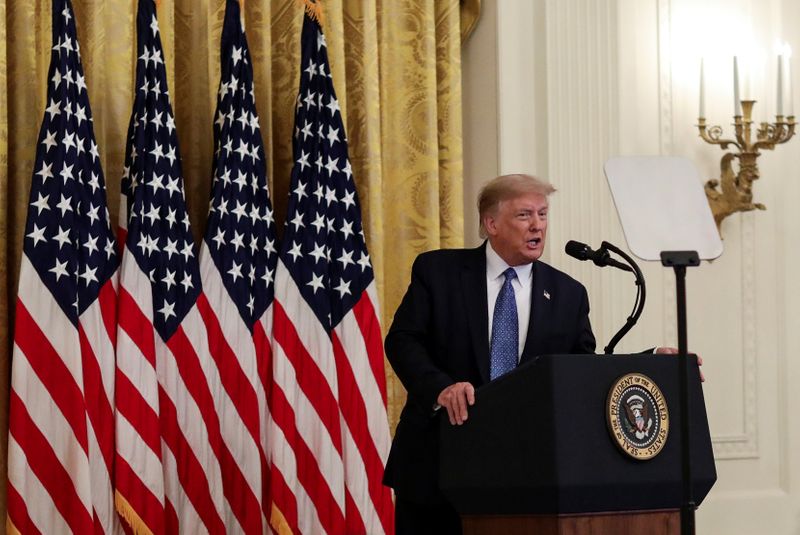By Andrew Hay and Nathan Layne
(Reuters) - Even as Chicago Mayor Lori Lightfoot said she would accept U.S. President Donald Trump's plan to send a "surge" of federal agents to fight violent crime in Democratic-led cities, Albuquerque, New Mexico's Tim Keller has rejected the deployment outright.
Both mayors are Democrats wrestling with violent crime and a history of police misconduct in their cities. But their reactions to Wednesday's announcement of an expansion of the Operation Legend program were hardly alike.
Lightfoot said she was reassured by the president about the presence of federal agents in her city under an expansion of the Justice Department-led operation, but Keller sees the Republican president's deployment as a political ploy.
"We won't sell out our city for a bait and switch excuse to send secret police to Albuquerque," Keller said in a statement, using a term associated with fraudulent advertising. "Operation Legend is not real crime fighting; it's politics standing in the way of police work and makes us less safe."
New Mexico's Democratic governor, Michelle Lujan Grisham, vowed to monitor the deployment for civil rights violations by federal agents. State Attorney General Hector Balderas, also a Democrat, said the initiative "politicized" public safety.
The skepticism about the president's intentions follows a series of violent clashes between federal agents and protesters in Portland, Oregon. On Wednesday night, Portland Mayor Ted Wheeler, who has rejected the deployment as provocative and counterproductive, was hit with tear gas when he joined the protesters.
Critics see the expansion of Operation Legend as part of a strategy of casting the president as a "law and order" candidate and give his sputtering re-election campaign a boost. He trails Democrat Joe Biden in opinion polls ahead of the Nov. 3 presidential election.
To be sure, the deployments in Albuquerque, Chicago and other cities are part of a different program than the Portland deployment.
Operation Legend, which began in Kansas City, Missouri, involves federal agents assisting local police in combating what the Justice Department has described as a "surge" of violent crime.
It coincides with the Department of Homeland Security's Operation Defiant Valor to deploy agents to protect federal facilities in cities such as Portland, where protests to demand racial justice have erupted for every night for weeks.
Trump on Wednesday appeared to mix the objectives of both operations, saying he was expanding Operation Legend to confront a "radical movement to defend, dismantle and dissolve our police departments" which had led to a shocking explosion in "heinous crimes of violence."
'OUT OF TOUCH'
In contrast with Keller, Chicago's Lightfoot said she was willing to give the operation a chance. After speaking with Trump on Wednesday, she told MSNBC that the president assured her that the influx of federal agents would not resemble the force led by the Department of Homeland Security in Portland, Oregon.
It was not immediately clear why Trump reached out to Lightfoot, who he has repeatedly dueled with on Twitter, but she told MSNBC they "understand each other" and she had "drawn a very, very sharp line" on federal actions.
While Trump's move has been opposed by the Democratic leadership of New Mexico and Albuquerque, it has divided law enforcement in the Southwestern state.
Albuquerque's police chief, Michael Geier, said Trump had failed to come through with $10 million in funding from his last operation to bring in federal agents.
"I won't hold my breath until we see all this actually come to fruition," Geier said in a statement.
Sheriff Manuel Gonzales of Bernalillo County, which includes Albuquerque, attended Trump's White House announcement of Operation Legend, prompting U.S. Senator Martin Heinrich, a Democrat, to demand his resignation.
"Instead of collaborating with the Albuquerque Police Department, the Sheriff is inviting the President’s stormtroopers into Albuquerque," Heinrich said in a statement.

Gonzalez vowed to keep working with federal agencies and said Heinrich was "out of touch" with social problems in New Mexico, the second poorest U.S. state with the second highest level of violent crime in 2018, the most recent year for which federal data is available.